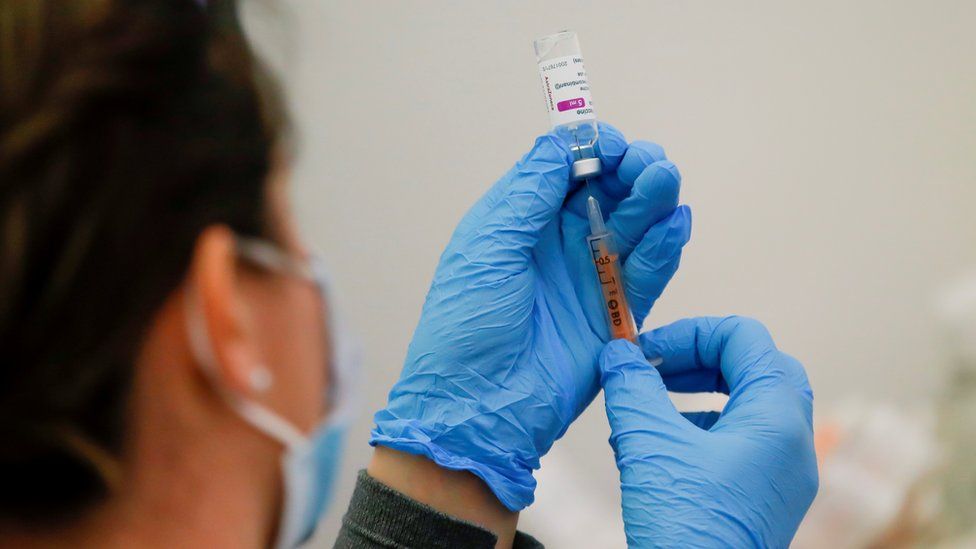Under 40s to be offered alternative to AZ vaccine
- Published
- comments

Most adults under the age of 40 will be given an alternative to the Oxford-AstraZeneca vaccine due to a link with rare blood clots.
The UK's medicines safety regulator says there have been 242 clotting cases and 49 deaths, with 28.5 million doses of the vaccine administered.
But the risk is slightly higher in younger age groups.
Low levels of coronavirus cases and the availability of alternative vaccines have also informed the decision.
Prof Wei Shen Lim, from the Joint Committee on Vaccination and Immunisation (JCVI), said they were putting "a high priority on safety" and he expected the move would "serve to boost confidence" in the vaccination programme.
Immunisation is estimated to have already saved 10,000 lives in the UK.
He added: "As Covid-19 rates continue to come under control, we are advising that adults aged 18- 39 years with no underlying health conditions are offered an alternative to the Oxford-AstraZeneca vaccine, if available, and if it does not cause delays in having the vaccine."
It comes as two-thirds of over-18s in the UK have now had a first dose - about 35 million people - and 31.8% or nearly 16.8 million have had both doses, according to the latest government figures.
A further 15 deaths within 28 days of a positive Covid-19 test were reported on Friday, and there were 2,490 new confirmed cases.
Finely balanced risks
The Oxford-AstraZeneca vaccine has been linked to distinctive, but rare, blood clots that also appear with low levels of platelets (which help clots form) in the blood.
The risk of a clot is roughly one in 100,000 for people in their 40s, but rises to one in 60,000 for people in their 30s. Two in a million people in their 40s died rising to four per million people in their 30s.
At the same time, the risks of developing severe Covid, if you catch the virus, fall in younger age groups.
Dr June Raine, the chief executive of the Medicines and Healthcare products Regulatory Agency (MHRA), said the benefits continued to outweigh the risks for the "vast majority of people".
She added: "The balance of benefits and risks is very favourable for older people, but is more finely balanced for younger people."
What happens if I don't get the Covid vaccine? Laura Foster explains
The supply of alternative vaccines, including Pfizer and Moderna, has made the decision possible.
The vaccination programme has also been unexpectedly successful in reducing the spread of the virus. This has changed projections for a "third wave" later in the year meaning the risk to younger adults is less than previously anticipated.
Most clots were after the first dose and people who have already had one dose of Oxford-AstraZeneca are advised to still have the second.
However, some under 40s will still be offered the Oxford-AstraZeneca vaccine as it is easier to both transport and store, making it more practical than the alternatives.
All adults are still expected to be offered their first dose of a vaccine by the end of July.
Follow James on Twitter
- THE BOOK THAT CHANGED ME: Mother of Dragons Emilia Clarke talks life-changing literature
- 'I COULDN'T HEAR MY VOICE': Moving forward after a serious accident
Related Topics
- Published7 April 2021